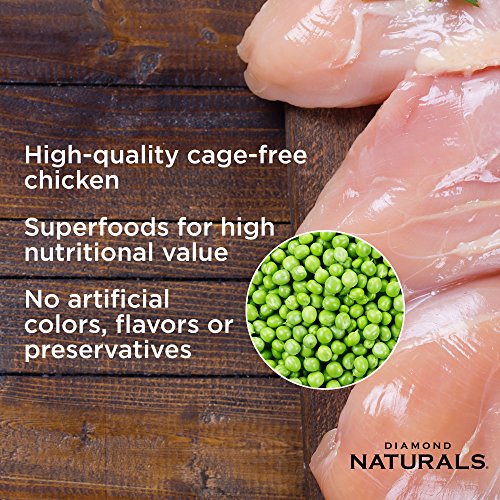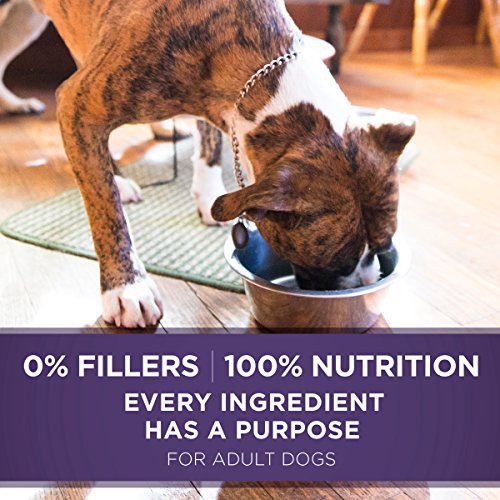A good number of people are afraid of growing old. They want to stay young forever; no sagging, no slowing down and no changes. However, the truth remains that aging happens to all of us, including our dogs. This is why people prepare for it, what with the pension schemes, retirement plans and all. How then can you prepare for your dog’s eventual aging? Senior dog food.
Granted, there are a number of other things to do in preparation for your dog’s aging. But looking up senior dog food ranks pretty high in the list of things to do. So whether your dog is already a senior dog citizen or your dog is a pup, you’ll want to stick around with us and soak up all the knowledge we have to give on senior dog food.
Remember, aging is something that happens to everybody and it will happen to your dog. So, best be prepared. But first…
Table of Contents
Who Is A Senior Dog?
It is general knowledge that a dog’s average lifespan is not as long as a human’s. However, there is no specific age that can be pinpointed as “senior dog age”. Senior dog age differs from one dog to another according to breed and species. So, an age that might be senior for one dog might be youth for another.
Bear in mind, however, that larger breeds typically age faster than smaller ones. So, while a Great Dane could be considered old at age 5, a Chihuahua will merit that status at probably age 10.
Most people give a blanket age bracket of between 5 and 10 years for all breeds and species but even that is not conclusive. However, what we’ll do for you is to give you a couple of signs that could point to aging in your dog.
Signs That Your Dog Is Aging
Aging signs in dogs are kinda the same as the aging signs in humans. Petmd lists a number of these signs as:
Eye Problems
A good number of dogs start to experience eye related problems as they grow older. It could be cataract, conjunctivitis and even vision loss. Nonetheless, not all dogs will experience eye problems as they grow. And not all eye problems are indicative of old age.
Urinary Problems
If your dog finds it painful to pee or she pees a lot, you need to look into because it could be a sign of a urinary tract infection. Urinary tract infections occur more among older dogs that’s why it’s listed here as an aging sign.
But don’t fret; it is something that can be alleviated with the proper medication. Just speak with your veterinarian and they should get you set up.
Oral Problems
While “too sweet” breath could be a sign of diabetes, bad breath could be an aging sign. If your dog is having this sign (even as a senior citizen) it is probably your fault.
Because it has always been up to you to ensure that she gets the proper oral care she should. If you haven’t been giving her that, it will eventually catch up with you both in her old age.
Skin Problems
As your dog gets older, she becomes increasingly prone to skin issues such as rashes, lumps and even hair loss. Be careful though, some lumps could be a sign of something pretty serious like cancer.
Weight Problems
Weight problems manifest as either unnecessary increase in weight or the inability to maintain weight. Neither of these is a cause for celebration. Both instances expose your dog to other health related issues so it is best to nip them in the bud.
Movement Problems
As your dog ages she might become more and more lethargic. It could be because she has some joint issues or simply because the idea of playing catch is just tiring. Whatever the reason, she might not move as eagerly and spiritedly as she used to.
Behavior Problems
Your dog might seem to be more irritable or confused. They might also seem to be experiencing some other behavioral changes. This could also probably be because she’s becoming a senior.
Allow us say here categorically, that all the signs pointed out here could be signs or symptoms of something wrong and not aging. So, if you notice any of these signs, don’t be quick to conclude. Speak with your veterinarian.
Also, your veterinarian can prescribe some medication and diet that can either do away with or alleviate the symptoms your senior dog is experiencing. Aging doesn’t have to be painful.
Why Your Senior Dog Needs Senior Dog Food

Looking at some of the signs of an aging dog, it is easy to see why senior dogs will need a change of diet. Diet is one of the most (if not the most) fundamental pillars of health. If your health is not alright, it’s probably because of what you’re eating and you need to change it.
In the case of aging, we know that problematic health might not be a result of diet. It could just be that the body is getting tired and can no longer do what it used to do. At those times, we look to diet again to provide help for the body where it can no longer help itself. This, people, is why your dog might need to switch her diet.
If you keep feeding her what you used to feed her but her body is no longer what it used to be, there are two things involved. You could either overburden her body, forcing it to work beyond its capability. Or you could end up leaving her body to fend for itself when it no longer can.
Hence, you need to put her on a senior dog food diet which should contain all the nutrients necessary to augment body function and at the same time not put the body into overdrive.
If your elder dog is still functioning optimally, you might not need to change her diet, you could just reduce the quantity. However, if your dog isn’t, then here are some things that her new diet should contain. (Whichever be the case, be sure to speak with your veterinarian first).
Components of a Senior Dog Food
Calories
As we said when we were talking about signs of an aging dog, some dogs increase in weight while others cannot maintain theirs. If your elder dog has the tendency to increase in size, you should opt for senior dog food with fewer calories.
An adult dog takes a lot of calories because he is energetic enough and will burn them. Your senior dog, on the other hand, is not as enthusiastic about jumping around. So, packing on the calories isn’t such a good idea.
However, if your dog’s issue is with maintaining weight, then you could reduce her calorie intake by a little. If you remove it altogether, you drastically reduce her chances of keeping her weight.
Protein
The jury is still out on whether to keep protein as is, reduce it, or increase the quantity as regards senior dog food. However, here’s what we can say. If your elder dog is having any form of kidney disease, reducing her protein intake is a good idea.
Protein doesn’t store in the body; the body just uses what it wants and sends the rest out as waste. This is not good for a dog that has kidney related issues (urine, a waste product, is practically produced in the kidney).
Giving her too much protein or even her usual protein quantity will cause her kidney (which isn’t performing at its peak) to work overtime. So you can help her by reducing her protein intake to just what her body needs so that her kidneys can have a breather. Consult your veterinarian and let them determine for you what’s OK.
(Click here to see our guide on low protein dog food).
Sodium
You might not need to bother about the sodium level of senior dog food. You can decide to increase or not increase the sodium level in your senior dog’s food. However, if your elder dog has issues like heart disease and even kidney problems, you might want to look into the amount of sodium she is consuming.
Fiber
If your elder dog is prone to increase in weight and you have reduced her calorie intake, you will need to add a lot of fiber to her diet. Because you reduced her calories, the food is no longer as filling as it used to be, so in order to pad it up, you could increase the quantity of fiber in her diet.
Also, aging dogs usually have issues with digestion. Adding fiber to or increasing fiber in their diet will help things go a lot smoothly.
Supplements
These are very tricky. Giving your dog supplements, senior or not, could be a good idea. Some commercially prepared senior dog food might already contain supplements, so no need to supplement the supplement.
However, whether you are preparing the senior dog food yourself or you are buying it, consult your veterinarian so as to know the right supplements and supplement combination for your senior dog. Because sometimes, the solution does not lie in the supplements.
When Your Senior Dog Can’t Eat
It is very common for senior dogs to not eat. It could be because of loss of appetite, digestive issues or dental problems. However, your dog needs to eat. So, what do you do?
• Speak to your veterinarian so that you can be sure it is not an aggravated health issue. If it is, he/she should prescribe drugs or the right diet modification that will entice your senior dog into eating something. Common health problems that could lead to loss of appetite include gastrointestinal issues, diabetes and even cancer.
• Some people suggest adding a bit of water or broth to your senior dog’s food. This is applicable if you feed her with dry food. If she’s not eating because her body finds it difficult to digest what she has ingested, this should do the trick. A little bit of liquid can do a whole world of good.
• Serving her home cooked meal with enhanced aroma is another good idea. If the food appeals to her at the aroma level, she might be motivated to try it out. Of course it should not just smell good but taste good too so that she doesn’t end up disappointed. If you are going to be serving her home cooked meal, visit your veterinarian to get approval on what’s good and what’s not.
• Of course, TLC never failed anybody. Pet her if you must and help her know that you are there for her.
Conclusion
Aging doesn’t have to be a terrible process for your dog. A little diet change and a whole lot of love should make things easy for you and your dog.



Pingback: Blue Buffalo Wilderness Senior Chicken Recipe Grain-Free Dry Dog Food – Detailed Review - Dog Products Guide
Pingback: Blue Buffalo Wilderness Turkey & Chicken Grill Grain-Free Senior Canned Dog Food – Detailed Review - Dog Products Guide
Pingback: Dog Mineral Supplements: The Know It All Guide - Dog Products Guide